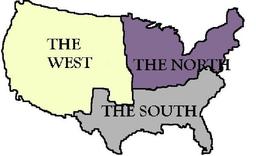Feel free to use or edit a copy
includes Teacher and Student dashboards
Measure skillsfrom any curriculum
Measure skills
from any curriculum
Tag the questions with any skills you have. Your dashboard will track each student's mastery of each skill.
With a free account, teachers can
- edit the questions
- save a copy for later
- start a class game
- automatically assign follow-up activities based on students’ scores
- assign as homework
- share a link with colleagues
- print as a bubble sheet
28 questions
Show answers
- Q1What is the definition of sectionalism ?An extreme pride in a countryA belief in no governmentAn exaggerated devotion to a regionA belief that the government should be ran by the people45s
- Q2Using this map, it can BEST be determinedNorthern states supported the Northern Democratic Party.Southerners did not support the Republican Party.The lack of women's suffrage supporters played a major role in Bell's defeat.All slave states supported the Southern Democratic Party.60s
- Q3"Bleeding Kansas is BEST described asThe conflict between immigrants and natives.The conflict between "Free-Soilers" and slavery supporters.The conflict between abolitionists and slavery supporters.The conflict between Republicans and Democrats.45s
- Q4During the Antebellum era, the principle of popular sovereignty meant that whether a . territory allowed slavery would be left up toThe United States Supreme Court.the citizens' votes in the territory.the United States Senate.the President most recently elected.45s
- Q5Which statement about the effects of the Supreme Court's decision in Dred Scott v. Snaford is TRUE?The decision had little impact on the sectional conflict between the north and south during this periodThe decision can be considered a victory for the northern abolitionists.The Supreme Court voted unanimously to emancipate (free) Scott.The decision can be considered a victory for southern pro-slavery factions.60s
- Q6When his owner took him into a free state, ____________ took the opportunity to sue for his freedom.Frederick DouglassDred ScottStephen DouglasNat Turner60s
- Q7Aboltionists often opposed annexation of western territories because theyfeared the addition of antislavery states.feared the extension of slavery.thought the land was too far away to govern efficiently.wanted to protect the Natives from British attacks.60s
- Q8Which of the following men attacked Harper's Ferry in hopes of obtaining ammunition and causing a slave revolt?John BrownNat TurnerDenmark VeseyJesse James60s
- Q9What was the main argument Southerners made in defense of slavery?It was up to the states to deal with the use of slavery because it was provided for in the Constitution.If the founding fathers had slaves, it should be OK for people who lived in the 1850s.Slavery was good because the enslaved were taken care of for life and it was a major component of the Southern economic system.The right to own slaves was guaranteed under the First Amendment of the United States.60s
- Q10Which BEST describes the efforts of William Lloyd Garrison?Advocated for educational reform in rural areas of the USOrganized an unsuccessful slave revolt in 1826Urged immediate emancipation of slaves in the United States.Advocated the settling of Liberia by feed slaves60s
- Q11When Virginia and Kentucy in the late 1700s and South Carolina in the 1830s refused to follow federal law, they were practicingPopular sovereigntyFederalismchecks and balancesNullification60s
- Q12The nullification Crisis of 1832 centered aroundDecreased trade with the French.Southern opposition to tariffs.Jackson's War on the Bank.The annexation of Texas.60s
- Q13This law, which allowed territories to decide the fate of slavery based on popular sovereignty, unintentioanlly had the effect of increasing tensions between pro-slavery and antislavery forces as they rushed west and had violent clashes over control of territory.Compromise of 1850Northwest OrdinanceKansas-Nebraska ActFugitive Slave Act60s
- Q14Why did Southern states object ot and resist the rarifs of 1828 and 1832Southerners were forced to pay increased taxes on slaves they imported from African and the Caribbean.The tariffs eventually brought an end to the slave trade.Southerners had to pay much higher prices on imported goods from countries affected by the tariffs.The tariffs were on goods shipped in from northern states.60s
- Q15Which event finally caused South Carolina to secede from the United States in 1860?The Missouri CompromiseThe firing on Ft. SumterThe Kansas-Nebraska ActThe election of Abraham Lincoln60s
